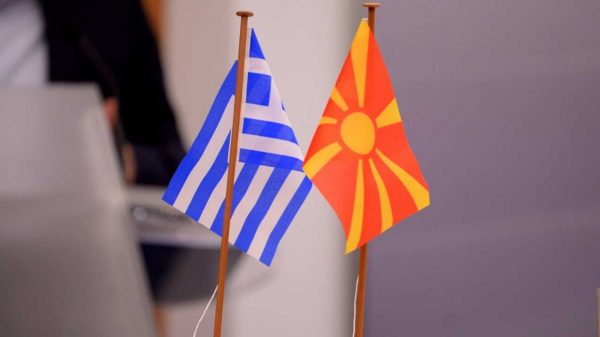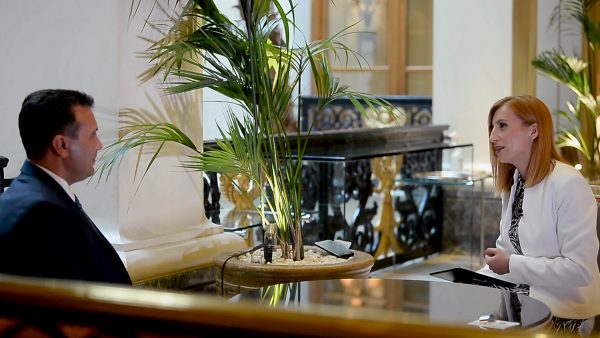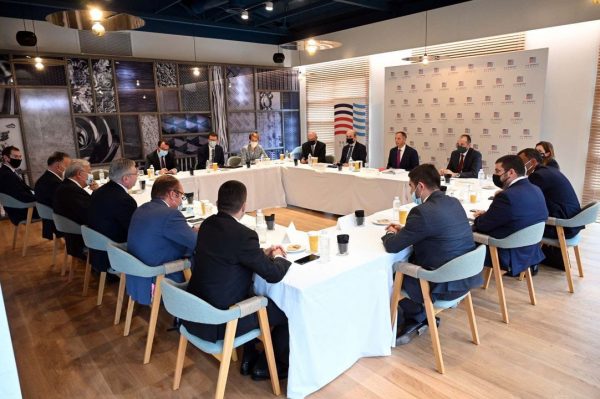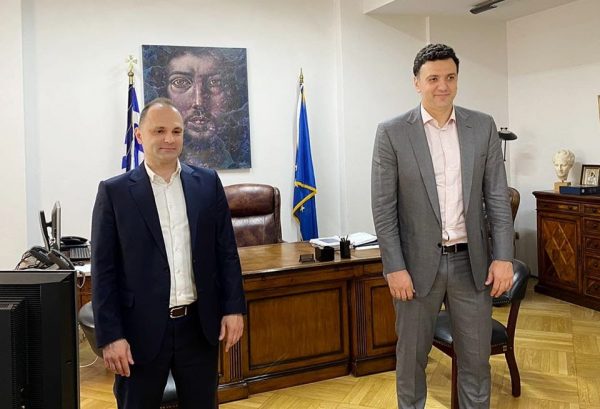It’s a fact that Greece and North Macedonia have boosted confidence, Greece’s foreign minister said in an interview in early June. Nikos Dendias’ statement is perhaps the best way to describe the countries’ relations throughout 2020.
The coronavirus pandemic didn’t disrupt the relations between North Macedonia and Greece entirely, but in some way it might have served as the reason for more intensified communication in handling and addressing the coronavirus and the consequences from the health crisis.
2020 marked the first visit paid by North Macedonia’s prime minister to Athens, bolstered cooperation, especially in the energy sector, the opening of communications channel between the health ministers of the two countries, and Greece continuously conveying support for North Macedonia’s EU integration efforts, says MIA’s Athens correspondent in an analysis.
The only ‘stain’ in the countries’ relations was the interrupted tourism season after Greece closed its land border in March and introduced a ban for entry of third-country residents.
The dispute with Turkey and the developments over Evros on one hand, and the COVID pandemic on the other, as well as Greece’s position to respect the agreements it had signed, contributed to the Prespa Agreement no longer being the topic of discussion in North Macedonia’s southern neighbor.
The July elections in North Macedonia were covered by the Greek media, but it didn’t grab the headlines, which was the case with previous elections. As ex-PM Alexis Tsipras congratulated PM Zoran Zaev on his election victory, a Greek government spokesman said the country expected cooperation to be resume with the new cabinet in North Macedonia.
High-level cooperation and communication resumed
Shortly before the second coronavirus wave in Greece, PM Zoran Zaev accepted an invitation to be part of the “24th Roundtable with the government of Greece”, organized by The Economist on Sept. 16-17 in Athens. He was accompanied by Deputy PMs Fatmir Bytyqi and Nikola Dimitrov, and Foreign Minister Bujar Osmani.
After a hiatus of almost 20 years, a prime minister of North Macedonia visited Athens. Zaev in the Greek capital met his counterpart Kyriakos Mitsotakis, President Katerina Sakellaropoulou, former prime minister and Syriza leader Alexis Tsipras as well as many Greek businessmen.
Furthermore, North Macedonia’s officials expressed interest in joining the construction of a liquid natural gas terminal in Alexandroupolis, which is eyed to become an independent entry point for supplying Southeastern European countries with natural gas.
In an interview with MIA, PM Zaev said, among other things, that the two-day visit, widely reported by Greek media, had taken place in positive atmosphere.
Mitsotakis and I, he said, discussed the possibility of holding the second intergovernmental session in Athens in the winter depending on the course of the pandemic and signing a double taxation avoidance agreement.
“We had talks in the spirit of friendship to show everyone what it means for two friendly countries that had signed a strategic friendship deal, because the Prespa Agreement doesn’t only regulate the settlement of the name dispute,” he told MIA’s correspondent in September.
At their meeting, Mitsotakis proposed Greece provide COVID-19 vaccines for North Macedonia and Albania.
Next, Zaev and Mitsotakis were supposed to meet in person at the Thessaloniki Summit in November, but it was organized online due to the pandemic. The prime ministers of North Macedonia and Greece delivered online addresses.
“As two friendly countries, we believe that the ways for improving investment activities and economic cooperation should mark an upward trend. The benefits of the strategic partnership agreements should be fully used to create a climate of uninterrupted economic development and for fresh and modern business initiatives,” Zaev said.
In his video address, Mitsotakis expressed support for the EU integration efforts of the Western Balkan countries.
“I’m confident that soon, with PM Zaev, we will reach an agreement on interstate connection to transport natural gas by 2023 and to re-open the Vardax oil pipeline, which we hope will start providing the Skopje-based oil refinery owned by ‘Hellenic Petroleum’,” he said.
Series of talks and meetings on energy cooperation
Energy and ways to cooperate in the sector were the focal point of a day-long visit to Thessaloniki of Deputy PM in charge of economic affairs Fatmir Bytyqi, Deputy PM Ljupcho Nikolovski, who is in charge of the fight against corruption, and Economy Minister Kreshnik Bekteshi to take part in in the roundtable “Regional Energy Security and Cooperation”, alongside US Secretary of State Mike Pompeo and Greek Minister of Environment and Energy, Kostis Hatzidakis.
Bytyqi called the event an excellent opportunity for sharing experiences in the energy sector, and to discuss potentials for cooperation. He noted: “Greece and North Macedonia are a good example of building of mutual relations, cooperation and strategic partnership.”
The countries intensify communication in the midst of the pandemic
The pandemic opened new communication channels between North Macedonia and Greece, more particularly between the health ministries.
Eleven days after the first lockdown in Greece was lifted, Minister of Health Venko Filipche traveled to Athens to meet his counterpart Vasilis Kikilias to discuss and share experiences involving treatment of and prevention from the spread of COVID-19.
The two ministers have resumed their communication especially in light of Greece providing vaccines for North Macedonia.
Foreign Minister Nikos Dendias and the then-Foreign Minister Nikola Dimitrov, who has since taken office as Deputy PM for European affairs, organized a regional online conference on issues related to COVID-19.
“Today we reaffirmed our determination to resume and enhance our cooperation and alleviate the consequences from the COVID-19 pandemic and lay the foundations for the region’s recovery,” read a joint statement after the second ministerial forum “Thessaloniki 2020”. It brought together the foreign ministers of North Macedonia, Greece, Bulgaria, Romania, Slovenia, Albania, Serbia, Bosnia and Herzegovina, Kosovo, as well as EU officials.
Greece engaged after France’s veto, but no sign of engagement after Bulgaria’s blockade
Shortly after France in 2019 vetoed the opening of EU negotiations with North Macedonia, the Greek diplomacy intensified its activities, including initiatives to support and promote the European perspective of Skopje and Tirana.
Greece organized a ministerial conference titled “From Thessaloniki to Zagreb” in order to highlight that the European perspective of the region is a top priority.
In March 2020, the EU leaders gave the green light for North Macedonia to start negotiations, which was universally welcomed in Greece.
“It an important day for the EU and the decision approving the opening of accession negotiations with North Macedonia and Albania reaffirms the “Thessaloniki 2003″ strategic agenda,” said Miltiadis Varvitsiotis, Greece’s Alternate Foreign Minister after a meeting of EU’s minister for European affairs.
After North Macedonia officially joined NATO last year in March, the Foreign Ministry congratulated the country on becoming the 30th NATO member. “Our neighbors, welcome to the NATO family. We expect constructive cooperation as part of the Alliance,” the Ministry tweeted.
Athens’ diplomatic activities seemed muted after Bulgaria vetoed North Macedonia in the EU.
After the veto, a government spokesman said that no one could prevent a member country from raising its own issues in the accession process.
“Traditionally, we champion strengthening of relations with the countries from the entire region and we have been supporting the European perspective of the Western Balkan countries. We’ll keep on doing so. We will – and we’ve said it before – support opening and closing of chapters in line with our interests,” said the then-spokesman Stelios Petsas.
Sofia’s move hasn’t affected Greece’s stable position on the European perspective of the region. Sources from the Foreign Ministry said Greece’s position is clear in supporting the Western Balkan countries to join the bloc on merit-based conditions.
Memos with North Macedonia yet to be adopted after being sent to Parliament four months ago
In September, prior to Zaev’s two-day visit to Athens, three agreements were sent to Parliament, including the memorandum on accelerating North Macedonia’s accession to the EU, the memorandum on forming a coordination committee for economic cooperation, and the technical agreement on monitoring the Skopje Flight Information Region. All three documents stem from the Prespa Agreement.
They still haven’t been adopted by MPs. The Greek Speaker has stated that their ratification hadn’t been considered as urgent matter.
Since the documents are the first since the transition of power in Greece, the opposition party Syriza, led by Alexis Tsipras, has said it will call for public vote once the ratification is in Parliament. The move, according to Tsiptas, should be somewhat of an apology of New Democracy MPs for their criticism of the Prespa Agreement before coming to power.
“There is no issue involving the ratification of the North Macedonia agreements in the Greek Parliament,” a government spokesman said in September when asked to comment media reports that the ruling party New Democracy couldn’t find a lawmaker to serve as rapporteur in Parliament for the three memos.
The three documents were signed at the first intergovernmental session in Skopje in April 2019.
The joint interdisciplinary commission on historical, archeological and educational issue – another obligation stemming from the Prespa Agreement – last month held its sixth meeting. Its members discussed the curriculums in the countries’ educational systems. The Commission is expected to convene again in February.
Under a decision signed by the Greek Deputy Education Minister, Sofia Zaharaki, the acronym FYROM will soon be replaced with “North Macedonia” in elementary education textbooks.
Macedonians prevented from visiting Greece for ten months
Due to the pandemic, Greece since March has closed its borders and banned third-country residents from traveling to the country. The borders will remain closed until January 21, according to the latest decision of the government, which is reviewing its decisions every two weeks. It has prevented Macedonian tourists from traveling to Greece, who traditionally spend their summer holidays in Greek resorts.
The new year brings new challenges to the relations between the two countries.
2021 could be the year of the second intergovernmental conference, ratification of the memorandums in Parliament and increased support from Athens to Skopje.
The new year starts off with intensified activities. Namely, Foreign Minister Bujar Osmani on Jan. 14 will visit Athens to meet his Greek counterpart Nikos Dendias.
The two ministers will sign three cooperation agreements: a memorandum for cooperation with Enterprise Greece, a civil protection memorandum and an agreement on cooperation between the diplomatic academies of the foreign ministries of North Macedonia and Greece.
Sanja Ristovska
Translation: Bisera Altiparmakova



















